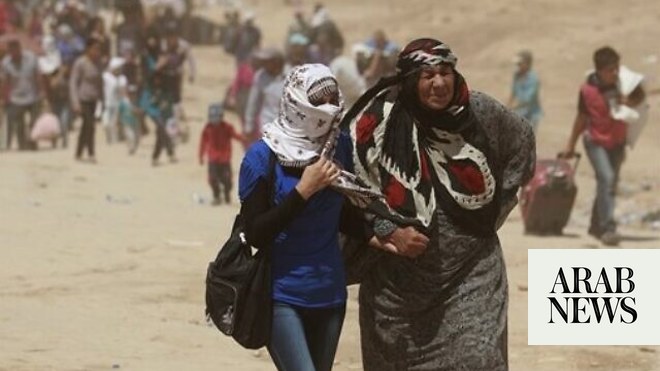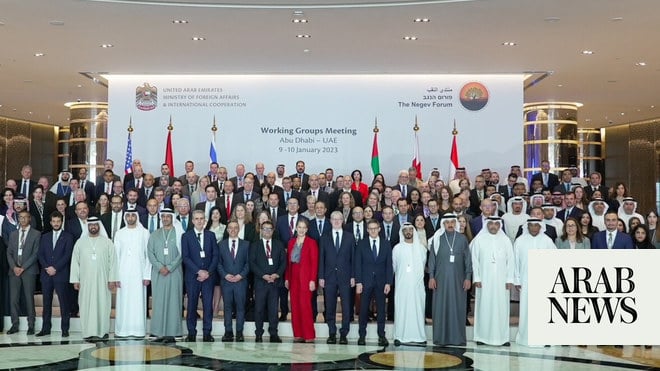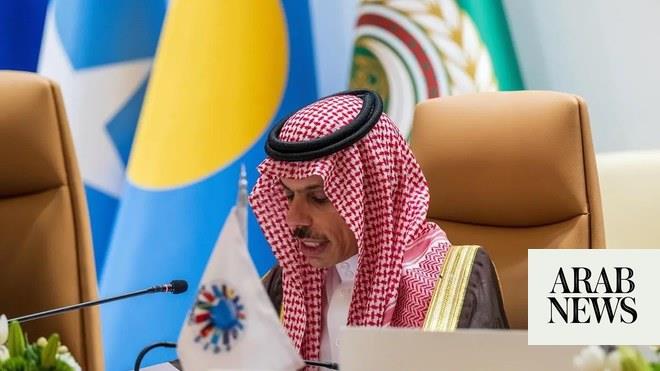
A proposal for even closer ties, included in a new report, was discussed by a panel of Israeli experts during an event hosted by the Middle East Institute in Washington
Panelists discussed the need for cooperation on issues related to water and climate, and ways in which civil society groups can play a critical role in promoting joint efforts
WASHINGTON: A proposal by Israel for enhanced cooperation with Arab states in efforts to tackle environmental issues such as climate change, global warming and water scarcity has been greeted with a muted public reception in the region, as a result of the continuing Israeli occupation of Palestinian territories and the low priority the Israeli government is perceived to place on such projects.
The proposal for closer ties was included in a newly published Israeli report on the environmental challenges faced by nations in the Middle East, which was discussed by a panel of Israeli experts and officials during a session hosted by the Washington-based Middle East Institute on Monday.
The experts focused on the need for more cooperation, in areas such as water management and renewable energy, between Israel and the Arab states with which it already has formal ties, including Morocco, Bahrain, the UAE and Jordan.
It was noted that the Palestinian Authority’s municipal powers in the West Bank are very limited and, as a result, its participation in regional planning and discussions about water scarcity and climate change have also been limited, mainly because it has no real powers to implement independent programs and has been severely weakened by the Israeli military occupation.
The audience at the panel discussion heard that Israel and Jordan launched a joint initiative called Eco Peace in 1994 after diplomatic ties between two countries were established. Its aim was to boost sustainable development and foster environmental cooperation between the two countries, and the Palestinians.
Israel and Jordan have also in recent years signed a declaration of intent for a joint water-for-energy project. Jordan would create 600 megawatts of solar power capacity in its deserts that would be exported to Israel to supply it with clean energy, while Israel would build water desalination plants on the Mediterranean Sea and provide water-scarce Jordan with 200 million cubic meters of desalinated water.
The agreement is supported by the US government and will be financed by the UAE. However, the project has faced strong opposition from the Jordanian public, with some arguing that Jordan is handing Israel the power to control its water resources, and others highlighting the ongoing mistreatment of Palestinians in the Occupied Territories.
The panelists discussed the need for cooperation on issues related to water and climate, and the ways in which civil society groups on all sides can play a critical role in promoting such joint efforts, such as the Eco Peace initiative.
The Middle East and North Africa is home to about 500 million people and is one of the most environmentally stressed regions in the world. It is very dry, with vast deserts and extremely limited water resources.
Israeli speakers at Monday’s event suggested that to overcome political hurdles in the region, local groups should engage with their governments to lobby for regional cooperation on environmental issues.
Gidon Bromberg, the co-founder and Israel director of Eco Peace Middle East, said: “Israel can produce water at a price that Jordan can only dream of while Jordan has the capacity to produce
power through solar, because of its vast desert and open areas, and produce renewable energy at a price that Israel can only dream of.”
He added, however, that his previous proposals had faced difficulties and been treated as a low priority under administrations led by Israeli Prime Minister Benjamin Netanyahu, who questioned “why Israel should be dependent on Arab states.”
Countries in the region should have a “healthy dependency,” Bromberg said, in the mold of European economic cooperation.
Galit Cohen, the head of the Climate and National Security Program at the Institute for National Security Studies in Tel Aviv and former director general of the Israeli Ministry of Environmental Protection, discussed Israel’s membership of the Cyprus government’s Initiative for Coordinating Climate Change Actions in the Eastern Mediterranean and Middle East, with the objective of developing a regional plan to address environmental issues.
She said the recent Abraham Accords agreements that normalized relations between Israel and several Arab states have helped with Israeli engagement and integration efforts in the Arab World. But she pointed out that Palestinians have not been represented in many of the regional environmental discussions.
Palestinians say that Israeli military encroachments and annexation activities in the West Bank have hampered any meaningful Palestinian participation in discussions about environmental issues.
Israeli ambassador Gideon Behar, Israel’s special envoy for climate change and sustainability, highlighted during the session some examples of Israeli and Arab cooperation on issues relating to the environment and water.
As one example of potential regional integration, he said that Israel is “a regional super power in the area of water desalination,” which puts it in a position it to supply Jordan’s urban centers with much-need water.











